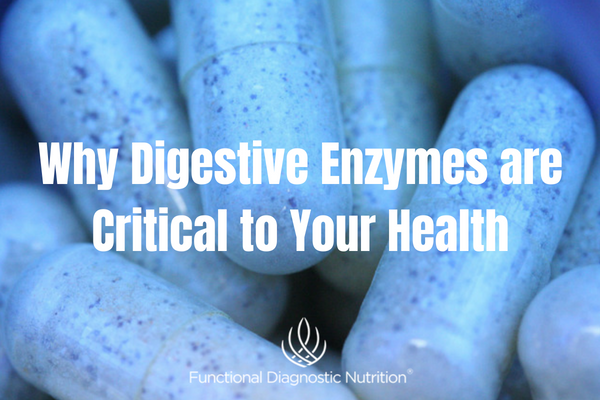Good health is dependent on properly digesting and absorbing the food we eat, and in turn, this ability is dependent on the availability of digestive enzymes. Although you’ve probably heard of digestive enzymes, chances are that your diet is deficient in them and that your potential for optimal health is being compromised as a result.
Enzymes are proteins that facilitate chemical reactions. Nearly every biological function of a cell depends on enzymes, and as such, they’re critical to our health. Similar to the theory that mammals are limited to approximately 1 billion heartbeats, it’s also believed that we have a limited capacity for enzyme production. Based on this theory, anything that puts unnecessary demand on the body to produce enzymes, such as a diet that’s deficient in them, could compromise health and shorten lifespan.
Enzymes Aren’t Just For Digestion
As I already mentioned, enzymes facilitate nearly all cellular activity which means that they support the function of organs, glands, and all other types of tissue that are critical to life. When digestive enzymes are not obtained through diet and the body must manufacture more of them to compensate, this infringes on the resources that are available to produce the metabolic enzymes that are needed to support these other important functions. Because of this, it’s desirable to regularly eat food that’s rich in enzymes and minimizes this unnecessary burden.
The activity of enzymes often depends on a variety of external factors such as temperature and pH, and when such external conditions are not appropriate, enzymes will remain inactive. This conditional behavior is what allows foods to be digested by the very same enzymes that they naturally contain. Research has shown that the digestive system recognizes when these enzymes exist in the food we eat, and in response, is able to conserve resources by limiting production of additional enzymes. As such, foods that are rich in enzymes are easier to digest because they reduce the burden on the digestive system, and by doing so, they also preserve the body’s capacity to produce metabolic enzymes.
In addition to breaking down the food we eat, digestive enzymes are also important to immune function. They help to break down bacteria, viruses, parasites, and damaged cells, all of which can pose a significant threat to our health. Furthermore, when digestive enzymes are obtained through diet, the resulting conservation in digestive effort reduces the chance of immune function being impaired by a limitation in capacity to produce metabolic enzymes.
Why the Modern Diet is Deficient in Enzymes
The enzymes naturally found in food are destroyed at 118 degrees Fahrenheit. As such, cooked food is generally lacking in enzymes and forces the body to compensate by producing more of its own. Because most processed foods are highly refined and exposed to high temperatures, they’re typically depleted of enzymes as well. Unfortunately, these two categories of food are staples of the modern diet. The pancreas produces most of the digestive enzymes that are needed to compensate for such a diet, and research has shown that such a burden causes it to enlarge which is generally recognized as a warning sign of overuse and dysfunction.
Natural whole foods are the foundation of a truly healthy diet, and consuming them raw will provide a natural supply of digestive enzymes that will relieve the body of unnecessary burden. In turn, the additional resources that remain will be available to produce the metabolic enzymes that will help to fight illness, prevent disease, slow aging, and promote optimal health.
Incorporating Digestive Enzymes Into Your Diet
Consuming more raw food to benefit from a natural external supply of digestive enzymes doesn’t mean that you need to become fanatical about eating everything raw. In fact, some vegetables can interfere with digestion and absorption when eaten raw, and some anthropologists believe that the cooking of meat has made important contributions to our evolution including a significant increase in brain size. In my opinion, the best way to incorporate digestive enzymes into your diet is to find a compromise between cooked and raw. An additional benefit of doing so is that raw foods are very easy to prepare and will reduce your cooking time.
Enzymes aren’t the only nutrients that are damaged or destroyed by heat, so the more you cook your food, the less nutritious it will be. I eat all fruit and nearly all vegetables raw, and although I typically cook meat, I do so at a low temperature of 225 degrees Fahrenheit or below. On occasion, I’ll eat beef or fish completely raw. Although some might say this increases the risk of infection, I believe this is much less of a concern with the quality of food that I buy. Either way, this is one of the many decisions in life that you’ll have to take accountability for and make yourself.
Another simple and natural way to take advantage of digestive enzymes is to chew more thoroughly. Saliva naturally contains enzymes that break down carbohydrates and fat, so the more time you spend chewing, the more of a chance these enzymes will have to predigest the food you eat. Furthermore, thorough chewing will break down food more completely, result in more surface area being exposed to enzymes, and in turn, reduce digestive burden.
The Value of Digestive Enzyme Supplements
Although I prefer to error on the side of obtaining nutrients from whole foods rather then supplements, I think digestive enzymes are worth consideration, especially if most of the food you eat is cooked or processed. While most supplements are intended to provide vitamins or minerals that aren’t adequately obtained through diet, digestive enzymes facilitate the ability to obtain more of these nutrients from the food we eat, and they reduce digestive burden in the process.
The digestive enzymes in supplements originate from animals or plants. Although both are beneficial, many people prefer plant enzymes because they have been shown to be more effective. In addition, it’s difficult to verify the quality of animal enzymes and be sure that they haven’t been taken from unhealthy livestock that were raised in factory farm conditions.
Although there are many different digestive enzymes, they all fall fit into the categories of proteases, carbohydrases, and lipases which respectively break down proteins, carbohydrates, and fats. Most supplements contain a combination of digestive enzymes from each category, and the higher quality brands usually list them by active units rather than grams and are also free of unnecessary fillers and additives. Depending on your nutritional individuality, it may be beneficial to find a supplement that combines these different types of enzymes in proportions that match your typical meal.
Additional Information
For more information about digestive enzymes and how our limited capacity to produce them affects our health, I highly recommend reading Enzyme Nutrition by Dr. Edward Howell. Although this book was written more than twenty years ago, it still provides a very compelling argument for the significant importance of digestive enzymes and is one of the most informative and influential resource on the topic.
Another interesting book that was written more recently is Everything You Need to Know About Enzymes by Tom Bohager. This book provides more detail about the specific enzymes used in supplements and explains how they can also be used without food to help resolve a number of health issues.
Photo credit: freeimages.com/Thomas Picard








